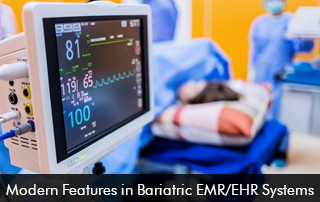With the rapid advancements in healthcare technology, Bariatric EHR software has become indispensable for medical professionals and institutions specializing in obesity and Bariatric medicine. These advanced electronic health record (EHR) and electronic medical record (EMR) systems are tailored to meet the unique needs of bariatric practices, ensuring comprehensive support for patients undergoing weight loss surgery or other treatments. From initial diagnosis to post-treatment care, these innovative solutions streamline the entire process, enhancing patient outcomes and practice efficiency.
Obesity-specific templates:
- Bariatric EMR software has obesity-specific templates that are carefully crafted to meet the special requirements of patients receiving obesity management.
- These templates function as all-inclusive digital forms that medical professionals utilize to record important information and monitor patients’ advancement along their weight reduction journey.
- Many comorbid diseases, including diabetes, hypertension, sleep apnea, and joint discomfort, are present in bariatric patients.
- The templates help with the recording of comorbidities, such as the dates and severity of diagnoses, treatment regimens, and modifications to medication in response to weight reduction.
Body Mass Index:
- Fields for documenting patients’ body mass index (BMI) are included in each visit or interaction template.
- Clinicians can evaluate weight management therapies’ efficacy by visualizing BMI changes over time using trend analysis techniques and graphical representations.
The patients’ weight reduction progress is tracked in detail with sections including beginning weight, goal weight, actual weight, percentage of excess weight loss (%EWL), and reaching weight loss milestones. The forms include areas to record patients’ food habits, calorie intake, distribution of macronutrients, level of hydration, and adherence to postoperative dietary instructions.
Nutritional intake is a crucial component of bariatric treatment. There is sections for tracking the degree of physical activity, exercise regimens, activity limitations, and involvement in formal exercise programs of patients. Psychosocial issues on stress management, emotional eating, body image, and self-esteem may arise for bariatric patients.
The templates gather specific information on surgical history for individuals undergoing bariatric surgery. Including prescription drugs, over-the-counter supplements, vitamins, and weight reduction drugs, clinicians may record patients’ medication histories in one area.
Integration of Telemedicine:
The smooth integration of telehealth functions into electronic medical records and electronic health record systems allows healthcare practitioners to give virtual treatment and assistance for weight control. This process is known as telemedicine integration in bariatric EMR software.
Virtual Consultation:
- Using secure, HIPAA-compliant video conferencing platforms embedded within the software, bariatric EHR software with telemedicine integration enables healthcare providers to interact virtually with patients, review patient charts, discuss test results, and adjust treatment plans as necessary.
- When bariatric patients are not seeing a doctor in person, they can be monitored virtually.
- To monitor their weight, physical activity, eating habits, and other health parameters, patients can utilize linked equipment like scales, wearable activity trackers, or mobile health applications.
- Delivering educational materials, counseling sessions, and behavioral interventions to patients to help them in their weight control journey is made easier.
Bariatric EHR software is enabled via telemedicine. It is easy to assist patients in making better decisions and reaching their weight reduction objectives, providers can hold virtual group sessions, provide individualized lifestyle coaching, and give patients access to online resources, instructional videos, and interactive tools. Following surgery, bariatric patients can have follow-up visits virtually to guarantee continuity of care and continued support. Colleagues on the medical team who treat bariatric patients work together and communicate with each other seamlessly.







